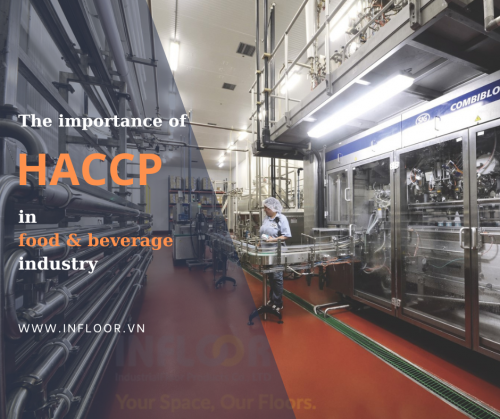
The importance of HACCP in food & beverage industry
The food industry is one of the broadest specific industries and getting the right infrastructure in place requires the consultation of experts in many different fields. In terms of facilities, one of the inherent difficulties of the food industry is that the facilities must meet strict standards of food safety and hygiene and at the same time must ensure the output of the unit. Especially in the food industry, flooring is also one of the factors that can greatly affect hygiene and product quality. Most floors in the food industry need to be replaced within 5-7 years. In order to limit floor damage in food production and processing establishments, strict quality control conditions and standards of facilities of production and business establishments must be strictly ensured in each stage. production and operation stages. When these standards are not guaranteed, it not only ensures the safety of the facility, but also affects the operational index of the facility.Common signs of floor that needs maintenance
Cracking or chippeed floor
The most recognizable sign is cracks, chipping appearing on the floor. In addition to the cause of concrete and reinforcement, the main cause is due to the ability of withstand shock and thermal cycling , and the load-bearing ability of the floor. The floor has poor thermal shock resistant, leading to floor cracking, so in the production conditions that require heat resistance, the constructor should take measures to use the appropriate materials. Besides, the load capacity also affects the durability of the floor, leading to cracking of the floor or making the crack bigger. When the floor is cracked, it loses the seamlessness of the floor system, and the cracks are also an ideal place for bacteria and mold. Cracks also cause water infiltration, absorbing chemicals and grease, which can affect the concrete layer, causing great damage to the facility.Buckling
Sudden changes in temperature in the operating environment of a food processing facility can easily lead to floor buckling. In order to limit possible damage during the operation of the facility, it is necessary to take appropriate measures to improve this condition as soon as it occurs.Stains
In food production facilities, production wastes such as blood, oil, and animal fat can spread to the floor, strong cleaning chemicals can also leave stains on the floor surface, affect the quality of the floor. These stains are also a sign of deterioration of the floor and an indication that the materials used to cover the floor are not up to the base manufacturing process. Therefore, when these stains appear, there should be ways to improve this situation. Having a standard floor surface is one of the prerequisites to ensure the operability of a production facility. Although often overlooked, floors are always the most affected areas such as direct contact with hooks, movement, production and storage of finished products. Failure to ensure safety standards for the floor may affect the quality of the finished product. Because of the above factors, has led to the birth of the HACCP standard, in order to provide a safety standard to help designers and investors have a standard to design and operate their production facilities.HACCP standards in food and beverage industry
HACCP is a standard to help designer, and flooring contractors determine the criteria and standards that facilities and production HACCP focuses on preventing food safety risks. The cost to repair damaged floors is very large, it not only affects financial problems but also affects the reputation of the unit. HACCP helps ensure food safety standards for the entire production process, from harvest to consumption, and the main goal is to prevent hazards in the first place.. Floor surface Meeting HACCP standards also helps to ensure the health and safety of employees, especially in a high-productivity working environment when the environment can cause slips and pollution. Besides, HACCP also emphasizes the importance of seamless floors and waterproofing. Because of the grout, and seams, the gaps will be a place for mold and bacteria to grow. Therefore, it is necessary to pay attention to maintaining the hygiene and safety of the floor surface for a long time not only to meet the standards of HACCP but also to provide the best working environment for employees. , as well as limiting floor degradation by workload. The HACCP standard is widely applied in industry and food processing. The HACCP standard is not only meaningful in terms of food safety and hygiene of the establishment for the state management agency, but also for consumers to help them believe that the product has met the standards. the strictest safety standards.Stonhard flooring solutions for food and beverage facilities
Stonhard provides a complete solution for manufacturing and processing facilities with products that are HACCP certified. Stonhard with many years of experience in floor finishing construction of production facilities, certainly brings the most optimal flooring solutions for the facility’s system. Infloor – the exclusive distributor and installer of the Stonhard brand in Vietnam, with the knowledge of geography, and management in the host country, Infloor will support customers to the maximum to achieve satisfaction in flooring construction.Residential Location:
2/14 Vo Truong Toan St, An Phu W, Dist.2, Hcm, VN.
Pham Van Tu - Managing Director

Post A Comment